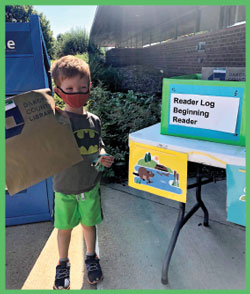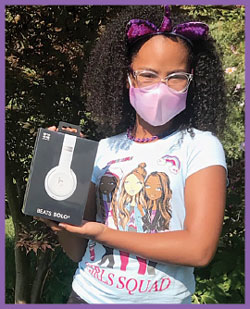Library Summer Reading Programs Can Help Combat COVID Slide
This year, it is more important than ever to make reading a part of every child’s summer, especially underserved children and teens, according to librarians.
 |
Young patron at Dakota County (MN) Library’s Summer Discovery programPhoto courtesy of Dakota County (MN) Library |
In a year when the usual summer slide in learning has stretched into a school-year slide, librarians say it is more important than ever to make reading a part of every child’s summer, especially underserved children and teens.
A new study by Policy Analysis for California Education (PACE) found that after first slowing dramatically in the spring of 2020, students’ oral reading fluency began returning to normal rates by fall (bit.ly/3aiNPJD). Still, it wasn’t enough to recoup the losses. Second and third grade students are about 30 percent behind where they would be in a typical year, says Heather Hough, PACE’s executive director.
The study also found a new learning gap between first through fourth grade students in traditionally higher-performing districts and those in lower-performing districts. The gap showed a difference in the rate of growth in oral reading fluency, essentially the ability to read quickly and accurately.
“What we’re really concerned about is if students don’t catch up, if systems don’t work really hard to catch up students in terms of their reading fluency, then it can create lasting and long-term effects,” says Hough.
Still, the loss can be addressed, she emphasizes. “We’re not saying these students are behind, period.” But catching up will require significant changes in literacy instruction.
For many libraries developing summer programming, addressing those reading deficits is top of mind. Others are looking hard at inequities in their services laid bare by the pandemic and adjusting programming to remove barriers to participation.
Cindy Christin, supervisor of children’s services at Bozeman (MT) Public Library, says that story time and all activities for young children are built on Montana’s early learning standards in literacy and derived from ALA’s Ready to Read program.
“We wanted to make sure that parents weren’t coming in and saying, ‘So all the kids are doing is, like, building blocks?’ We say, ‘Well, let us show you what your child is learning by doing that.’ ”
Christin is also president of the Collaborative Summer Library Program (CSLP), a nonprofit that publishes evidence-based ideas and activities for libraries to design summer reading programs, from developing early literacy skills to teen video challenges. Before Montana Public Libraries joined CSLP in 2001, the state “was a hodgepodge of low-quality, badly implemented summer reading programs,” says Christin.
Researcher Susan Neuman cautions that to be effective, reading programs must target vocabulary. “You can’t just learn vocabulary through reading; you need an explicit vocabulary program,” says Neuman, a professor of childhood and literacy education at New York University’s Steinhardt School and creator of the World of Words program. Early readers need more focused summer programs that include content in STEM, social studies, and the world, Neuman says. “Lots of times story hours are focused on narrative but not informational books.”
But many librarians worry that giving students of any age books that remind them of school may turn them off reading. The idea of summer reading is to “have fun finding books for kids that they’re not going to take a test on, they’re not going to be graded on,” says Sarah Bean Thompson, youth services manager at Springfield-Greene County (MO) Library. “I always tell them they can read whatever they want; let’s find something enjoyable, let’s find the joy in reading.”

Christin says that when Montana schools used to give each child their reading level at the end of the school year, parents would come into the library at the beginning of summer and say, “‘My son is reading at a ninth grade reading level.’ Parents wanted them to read classics like The Old Man and the Sea and The Jungle Book, and I’d say, ‘That’s fabulous, you are a lucky parent; what does your child want to read?’”
Books that teachers assign to strengthen reading and comprehension skills, and books for enjoyment, aren’t at all mutually exclusive, says Miah Daughtery, director of content, advocacy, and design for English literacy Arts for NWEA. “Librarians are perfectly positioned” to support both.
“Librarians can learn what reading skills students are working on, but instead of recommending instructional texts, they can suggest books that are content rich and interesting,” says Daughtery. “The library should be fun! There’s no point recommending a book to a kid if they’re not going to read it.”
Middle and high school students in the teen virtual book club at the Zion-Benton Public Library in Illinois receive a YAASS (Young Adult Awesomely Super Subscription ) Box with a book to keep, plus treats and themed goodies to encourage and reward participation. The library covers rural, suburban, and urban areas with a diverse population.
“Black Lives Matter has affected the community very heavily,” says Dawn Abron, creative space and teen services coordinator. The books focus on social justice themes dominating the news, such as Angie Thomas’s The Hate U Give and Jason Reynolds’s Long Way Down. This summer, Zion-Benton is adding YAASS Boxes for preteens, called Woke Boxes.
Whether they’re called Take-and-Make, Grab-and-Go, or something else, these kits have become programming staples. “It’s going to be part of what we do now,” says Thompson. Springfield-Greene County Library started its kits last year with a state grant for summer reading. Their success was helped, in part, because they are a good extension of programs for people who can’t bring their kids to library events due to work or distance.
Last year, before COVID, the Uniondale (NY) Public Library had 200 teens registered for summer programs. But only 40 signed up when programming went virtual. Syntychia Kendrick-Samuel, head of young adult services, says the drop occurred because the library couldn’t rely on its usual outreach efforts of visiting schools and neighborhood events to advertise.
She expects numbers to increase this summer. With a $30,000 budget for summer programs and generous donations, the library is offering incentives for teens to sign up for books clubs, online trivia games, a virtual poetry festival, and outdoor events. Every participant receives small items as they complete activities. At the end of the summer, the library will raffle off big-ticket items including bicycles and headphones.
 |
Corie, a participant in Uniondale (NY) Public Library’s summer reading club, won a pair of headphones.Photo courtesy of Uniondale (NY) Public Library |
The idea behind incentives is simple: They draw local children and teens to the library, where they might discover that reading can be fun. “From day one, I want these kids to know that their libraries are just as good as wealthier communities that have a bigger tax base. We never charge program fees,” says Kendrick-Samuel, who cochairs the Nassau County Library Association Library Staff of Color committee. In Uniondale, more than a third of residents are immigrants, three-quarters are Black or Hispanic, and many families are low-income.
Other librarians are striving to level service inequities magnified by COVID. “The pandemic really made us rethink the programmatic barriers that we had,” says Renee Grassi, youth services manager at Dakota County (MN) Library.
Up to now, children and teens who completed the library’s Summer Discovery reading program received a book to keep at the end of the summer. This year, they’ll choose their book at the start. It isn’t easy for everyone to get to the library, says Grassi. So instead of coming at the beginning to pick up reading log and other materials and again at the end to select a book, they make one trip.
The change encourages participation, whether or not the kids finish the program. “We don’t want to stigmatize kids who may have a different relationship with reading and learning,” says Grassi.
Zion-Benton has a large outdoor space and is moving some summer activities outside, with safety measures. The library has also partnered with the Kohl Children’s Museum of Greater Chicago to do a daily pop-up of its interactive exhibits on water, music, art, and nature for young children. It will reopen the indoor
makerspace for teens—by reservation only; librarians will provide instruction sheets, since they won’t be able to stand next to kids to show how things work.
During the pandemic, librarians sometimes learn about a student’s interests over Instagram discussions and book chats; others say teens are more willing to open up on a screen and ask questions when they’re unseen and not using real names. Still, Kendrick-Samuel looks forward to talking books with teens face to face.
She recalls one teen she advised in person during summer programming in the past. ‘Everything was, ‘I don’t want to do this, it’s dumb,’” she says. Then she gave the girl Reynolds’s Long Way Down. “She took it, but complained,” says Kendrick-Samuel. “But the next week she said, ‘Do you have another book by him? I’m not saying I liked the other one, but do you have more?’”
“I have met many a student that said, ‘I don’t like to read, reading’s not my thing,’” says Daughtery. “I have yet to meet a student who doesn’t like to read when they have the right book.”
Kathryn Baron is an education reporter based in California.
RELATED
The job outlook in 2030: Librarians will be in demand
The job outlook in 2030: Librarians will be in demand
ALREADY A SUBSCRIBER? LOG IN
We are currently offering this content for free. Sign up now to activate your personal profile, where you can save articles for future viewing






Add Comment :-
Be the first reader to comment.
Comment Policy:
Comment should not be empty !!!